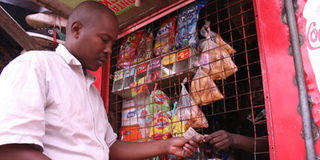High cost of living biggest problem for Kenyans, says survey

PHOTO | PHOEBE OKALL | FILE A customer buys goods at a kiosk in Nairobi. Respondents in an Ipsos Synovate survey said the high cost of living was their biggest problem.
What you need to know:
- Lack of jobs also features high as among issues worrying the public
A majority of Kenyans have confidence in President Kenyatta’s leadership although they feel their economic wellbeing and security have worsened since his administration took power.
An Ipsos Synovate survey showed 51 per cent of Kenyans have confidence in President Kenyatta, followed by his deputy William Ruto and religious leaders at 48 per cent, the media (46) and governors (36).
The survey involving 2,000 respondents assigned the police and political parties the lowest confidence levels at 14 per cent.
Senators performed better than MPs at 36 per cent compared with the latter’s 17 per cent.
The survey conducted was between June 23 and June 30.
The opinion poll showed that the high cost of living was the most serious problem facing Kenyans, with 54 per cent of respondents mentioning it, up from 39 per cent in November 2012.
Forty-nine per cent of those interviewed said they had less money in their pockets compared to three months ago due to worsening economic conditions with only 16 per cent reporting an upturn in their fortunes.
Need to relook
“With 54 per cent of Kenyans stating that the high cost of living is the main issue of concern and another 49 per cent stating that their general personal/household economic conditions have worsened, there is serious need to relook at some of the policies that touch on livelihoods, for instance, the VAT Bill,” Dr Wolf said.
Respondents from Nyanza (67 per cent), Western (62 per cent)and Central (55 per cent) had the highest rating among those who felt that the high cost of living was the biggest problem.
Eighty-six per cent of respondents also opposed charging of VAT on foodstuffs, with a majority also saying it is the thing they do not like most in the Budget.
VAT, they said, will hurt the poor and increase the cost of basic goods.
Those who said their condition had worsened were in Western, Nyanza, Coast, Eastern and Nairobi regions.
President Kenyatta has secured the support of Jubilee MPs to support amendments to the Bill with a view of exempting maize flour and bread from taxation.
The second most serious problem, the poll found, was unemployment (21 per cent), followed by insecurity (seven per cent). Respondents from Nairobi (28 per cent), Eastern (26 per cent) and Coast (22 per cent) felt lack of jobs was the most serious problem facing the country.
On Security, 46 per cent said it had worsened since the polls, while 31 per cent indicated it had improved.
Most of those who felt security had worsened were in Western, Nyanza, Nairobi, Rift Valley and Eastern regions and blamed it on the government and police.
Jobless youth were also blamed for insecurity.
Laptops project
Of the Jubilee promises, it is only the laptop project that was remembered by more than half of the respondents at 65 per cent, followed by health care (45 per cent), Education (29 per cent), youth empowernment (24 per cent), security (22 per cent) and creation of jobs (13 per cent).
Interestingly, only 29 per cent of respondents believe the one laptop for every Standard One pupil will be implemented with healthcare receiving highest confidence of delivery at 53 per cent.
Thirty-five per cent of the respondents believe the education pledge will be met, compared to youth empowerment (34 per cent) and security (31 per cent).
The government has waived maternity fees in public hospitals while there has been considerable debate on the laptops, which are expected to be given to children joining Standard One in January.
Victims of crime
“Going by the level of confidence seen between that of laptops and improved healthcare, the data shows that Kenyans’ confidence in promises rises when they are translated into action,” Dr Wolf said.
On other public interest issues, some 10 per cent of respondents reported being victims of crime in the last three months with Nairobi recording the highest number of cases.
Fifty-eighty percent of those who reported crimes to the police were unhappy with the response while an equal number did not go to the authorities.
A total of 2,000 respondents participated in the survey. Some 493 people were interviewed in Rift Valley followed by Eastern with 299 while 262 were interviewed in Central and Nyanza. In Nairobi, 210 people were interviewed, followed by Western (203) Coast (176) and North Eastern (95).




